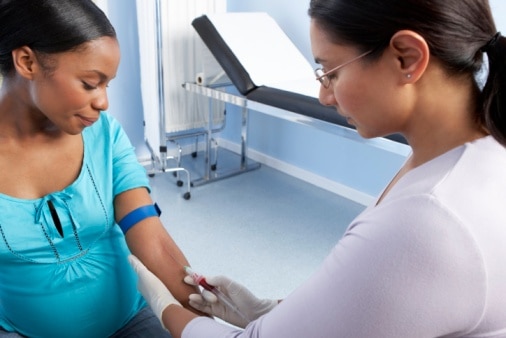Tests & Diagnosis for Gestational Diabetes
When will I be tested for gestational diabetes?
Testing for gestational diabetes usually occurs between 24 and 28 weeks of pregnancy.
If you have an increased chance of developing gestational diabetes, your doctor may test for diabetes during the first visit after you become pregnant.
How do doctors diagnose gestational diabetes?
Doctors use blood tests to diagnose gestational diabetes. You may have the glucose challenge test, the oral glucose tolerance test, or both. These tests show how well your body uses glucose.

Glucose Challenge Test
You may have the glucose challenge test first. Another name for this blood test is the glucose screening test. In this test, a health care professional will draw your blood 1 hour after you drink a sweet liquid containing glucose. You do not need to fast for this test. Fasting means having nothing to eat or drink except water. If your blood glucose is too high—140 or more—you may need to return for an oral glucose tolerance test while fasting. If your blood glucose is 200 or more, you may have type 2 diabetes.
Oral Glucose Tolerance Test (OGTT)
The OGTT measures blood glucose after you fast for at least 8 hours. First, a health care professional will draw your blood. Then you will drink the liquid containing glucose. You will need your blood drawn every hour for 2 to 3 hours for a doctor to diagnose gestational diabetes.
High blood glucose levels at any two or more blood test times—fasting, 1 hour, 2 hours, or 3 hours—mean you have gestational diabetes. Your health care team will explain what your OGTT results mean.
Your health care professional may recommend an OGTT without first having the glucose challenge test.
This content is provided as a service of the National Institute of Diabetes and Digestive and Kidney Diseases
(NIDDK), part of the National Institutes of Health. NIDDK translates and disseminates research findings to increase knowledge and understanding about health and disease among patients, health professionals, and the public. Content produced by NIDDK is carefully reviewed by NIDDK scientists and other experts.
The NIDDK would like to thank:
Boyd Metzger, M.D., Northwestern University

